China’s Ministry of Education (MOE) declared that over 662 thousand Chinese studied abroad in 2018. The top three preferred countries were United States, United Kingdom, and Australia. The number of Chinese students studying abroad increased in the past decade and seemed to continue rising. However, due to the Coronavirus impact, the future of the study-abroad market in China, needs to be reevaluated. Our research shows that the COVID-19 pandemic may have discouraged many Chinese students from studying or working abroad, which would have a long term impact on Universities and job markets around the world.
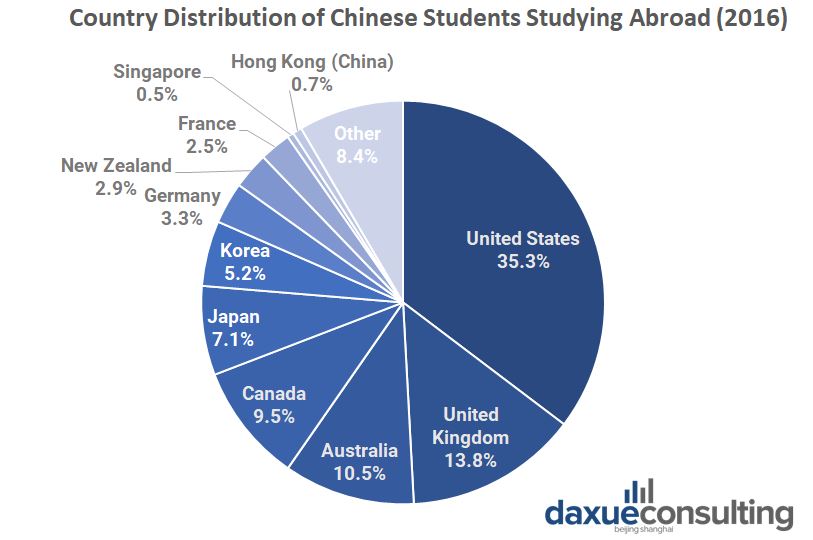
Data Source: JJL Overseas education, Country Distributions of Chinese Students Studying Abroad
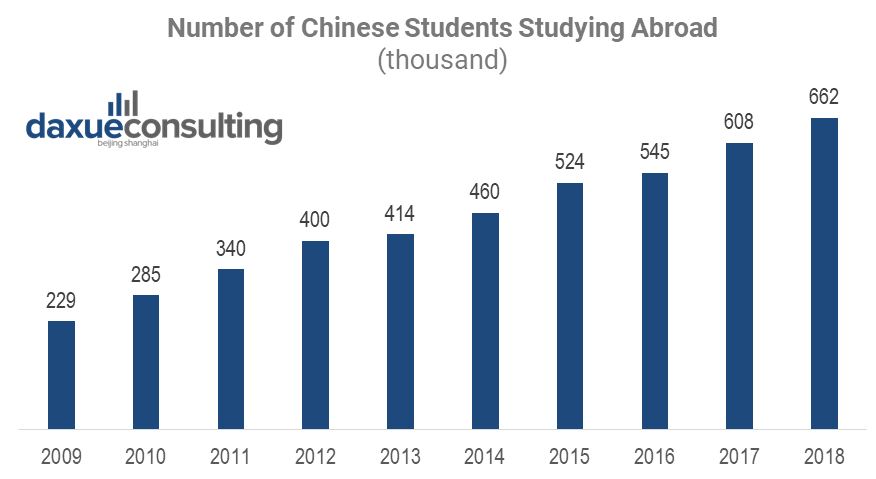
Data Source: MOE, Number of Chinese Students Studying Abroad from 2009 to 2018
How COVID-19 impacted Chinese students studying abroad, and why it is important
When discussing studying abroad, the focus is often on the benefits of the individual students. However, the exchange of students in foreign countries is beneficial to society in many ways, especially in fostering and attracting talents. Hence, the negative impact of COVID-19 on Chinese students’ willingness to study and work abroad will inadvertently impact foreign industries if it manifests as a smaller talent pool for key industries.
In the ’90s, self-funded studying abroad became popular, triggering the boom of Chinese students abroad. Until 2011, most Chinese students who chose to study overseas stayed overseas after graduation. At that time, China’s economy was not as robust as now, so living in flourishing countries seemed to be more attractive for ambitious young professionals. Those overseas Chinese worked hard and make great contributions to overseas countries’ development, working in booming industries like tech in Silicon Valley.
Starting in 2008, when the global financial crisis broke, more Chinese students went back to China to contribute to the country’s development. The current overarching trend is that the amount of Chinese students abroad is growing faster than the amount of Chinese workers abroad.
National Bureau of Statistics’ report indicates that more Chinese went back to China, and the trend was rising since 2008. In 2017, the rate that Chinese students returned to China was 79%, over 74% compared to 1987. In 2018, nearly three-quarters of Silicon Valley tech employees were foreign citizens.
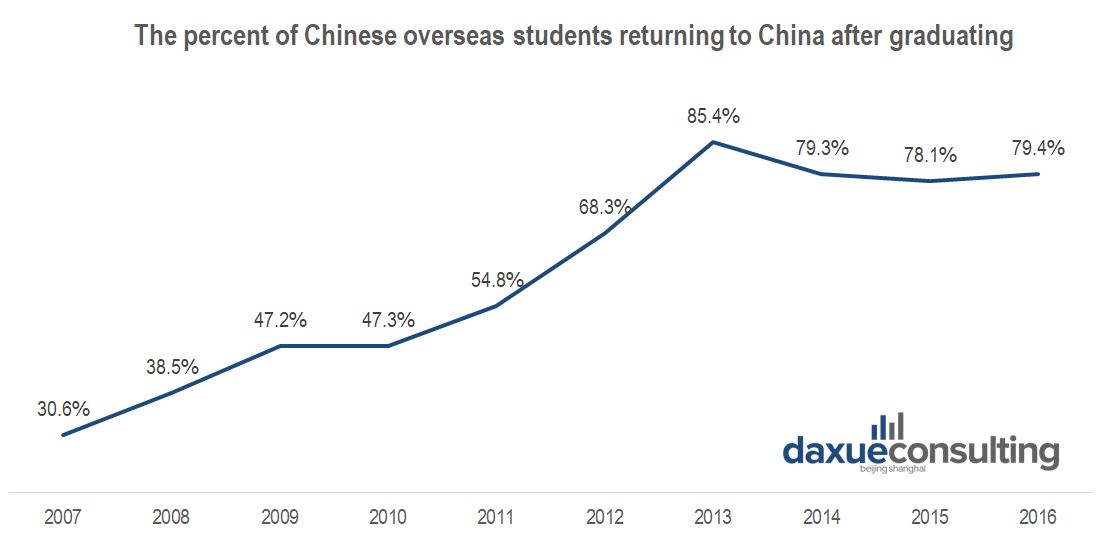
[Data Source: Chyxx “The Rate That Chinese Students Returned to China”]
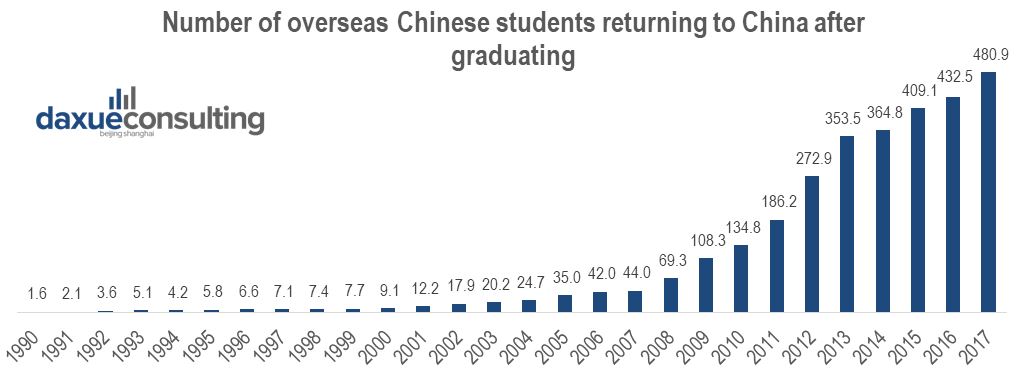
Data Source: National Bureau of Statistics of China, Number of Overseas Students that go Back to China After Graduation
The trend of Chinese overseas students leaving the country after graduating is also reflected in the US visa statistics. In the year 2000, the ratio of student to temporary work visas for Chinese citizens in the US was around 1:2. Come 2015, the year when Chinese studying in the US peaked, there were 12 student visas for every temporary work visa issued to Chinese, a 1:12 ratio. In 2019, this number has dropped to 1:3 due purely to the shrinkage of student visa issuances.

Data source: US Department of State, US temporary work and study visas issued to Chinese nationals 2000-2019
Trends of the the overseas Chinese students after COVID-19
According to our mini-survey, there is evidence that COVID-19 has impacted the willingness of Chinese students to study and work abroad. However, most of students do still insist on their former plans. 22.6% participants changed their plans to study overseas, causing some impact on study-abroad market in China.
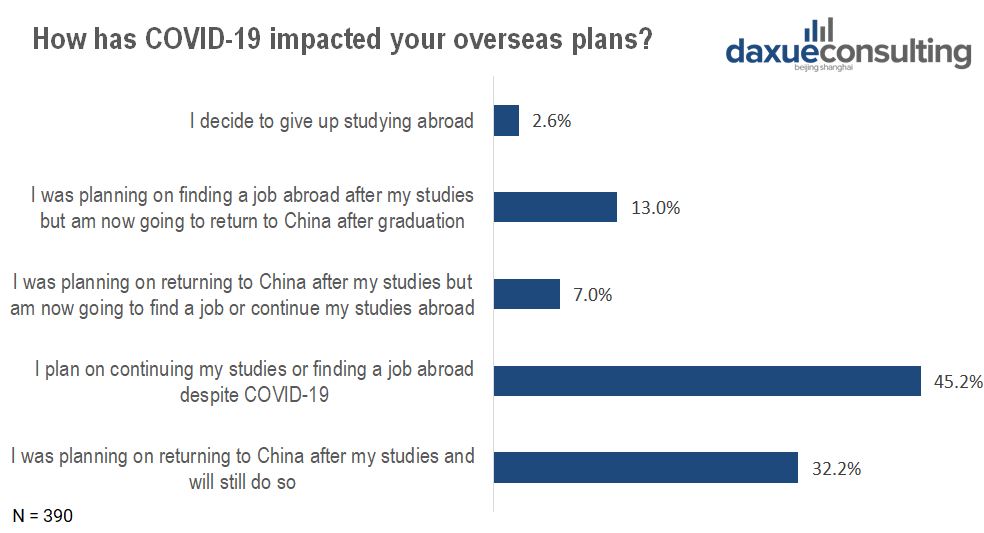
Data Source: Daxue consulting COVID-19 student impact survey: Chinese students abroad’s plans
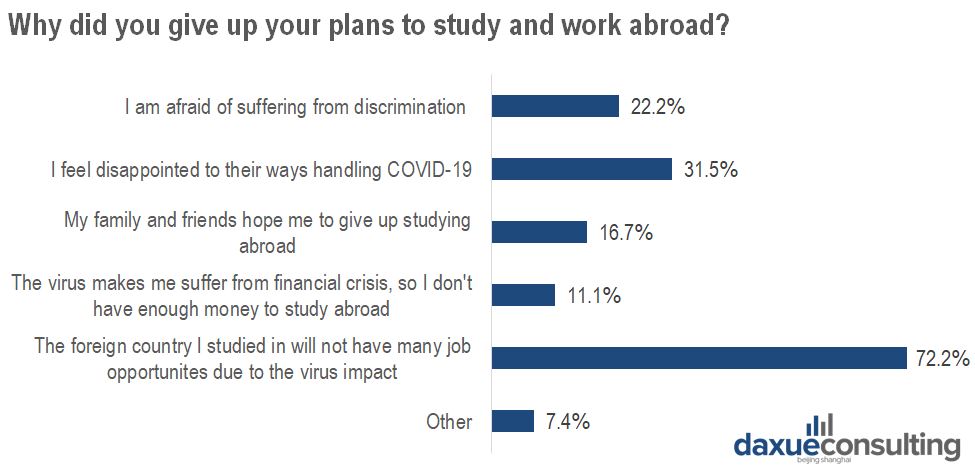
Data Source: Daxue consulting COVID-19 student impact survey: Reasons Why Students Give up Studying Abroad/Working Abroad
Few Chinese students give up studying abroad
Although facing so many difficulties, only 2.6% of participants decide to abandon study abroad. Many students share that they cannot control the trend of the virus, but can keep positive to face difficulties. Maybe they will choose to extend the enrollment time of their programs but not give up studying abroad. Additionally, more Chinese students may study abroad in the future since numerous people didn’t get jobs this year.
More people lose interest in working overseas
Working overseas after graduation used to be popular, but now the situation is different. Daxue’s mini-survey shows that before the virus, 91.6% had at least a little interest in working abroad. However, after the outbreak of the Coronavirus, 20.3% expresses no interest in working abroad, increasing over 11.18% than before. One reason is that the virus causes a decrease in job opportunities. Some comments also show that many Chinese students feel disappointed in western countries’ poor handling of Coronavirus. Thus, more students realize that they prefer to work in China.
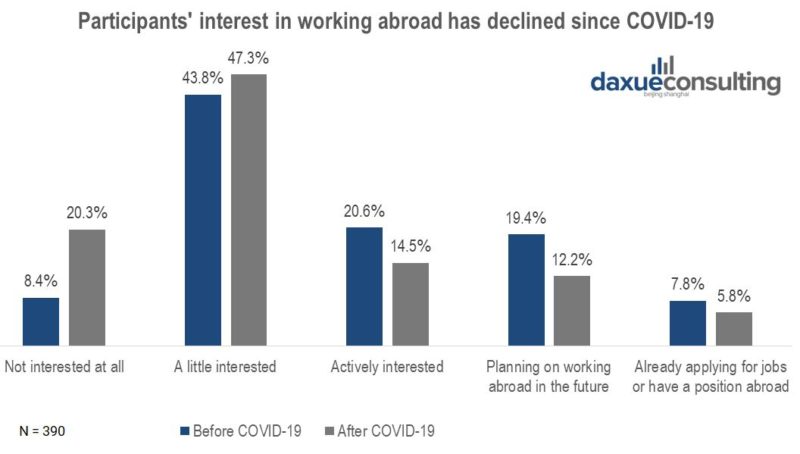
Data Source: Daxue consulting COVID-19 student impact survey: Participants’ Interests in Working Abroad before and after COVID-19
COVID-19 caused various worries for Chinese students studying abroad
The sudden virus disturbed people’s ordinary lives, especially students. Caught in the middle of this are students in foreign countries away from family, hence Chinese students studying abroad also met many difficulties.
Chinese students currently studying abroad were mostly concerned with finding a way home, and their healthcare.
Due to the outbreak of the Coronavirus around the world, almost all countries shut schools, forcing all students to take classes online. With flights grounded and schools closed, many graduates worry about whether they can go back home before their visas expire. Students staying abroad are also afraid that they cannot get guaranteed medical service if they get sick abroad.
Meanwhile, there is increased in discrimination against Asians in many western countries. Chinese students around the world are facing discrimination, in the form of slurs, attacks and avoidance, all while many Chinese abroad felt disappointed by how few westerners took the virus seriously. Meanwhile, the potential economic recession causes difficulties in seeking jobs. Various companies stop hiring and even laying off many employees. On May 18th, The Mercury News reported that the Bay area laid off over 100,000 employees over eight weeks.
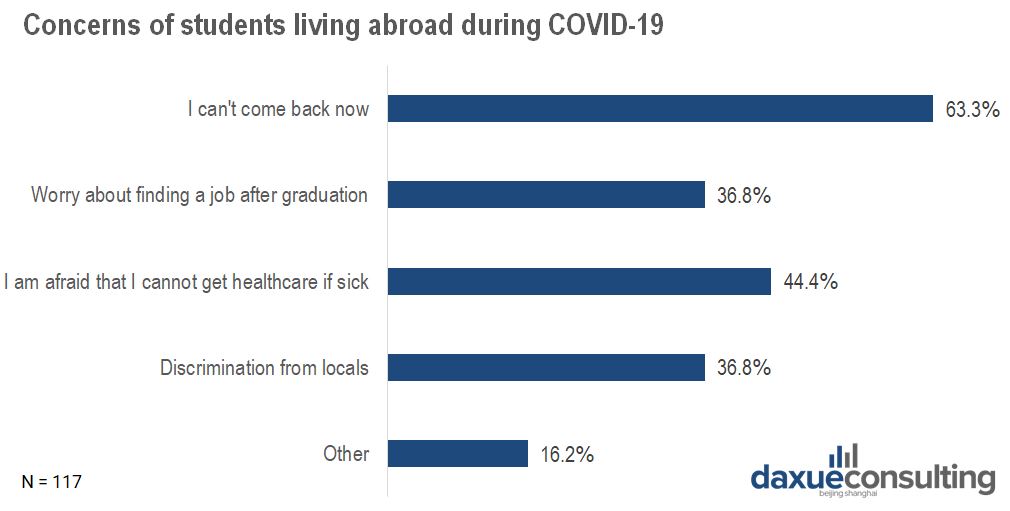
Data Source: Daxue consulting COVID-19 student impact survey: Worries of Chinese students abroad during COVID-19
Students who returned back to China also faced challenges
Some students returned to China, but they still met frustration. The pandemic influenced both their physical health and mental health. Students are hard to communicate with professors and classmates effectively because they are in different time zones. 77.65% of the mini-survey participants complain of a decrease in class quality. They also face degree certification issues when looking for jobs in China as they didn’t stay abroad to complete education. There is a requirement of students to study overseas for at least six months to get degree certification. Fortunately, now, MOE commits that their certification will not be influenced considering this unusual situation. Those students also are concerned that they cannot find ideal jobs as the current employment environment is poor in China. 44.7% of respondents say that they have lost an internship or job opportunity abroad during the pandemic.
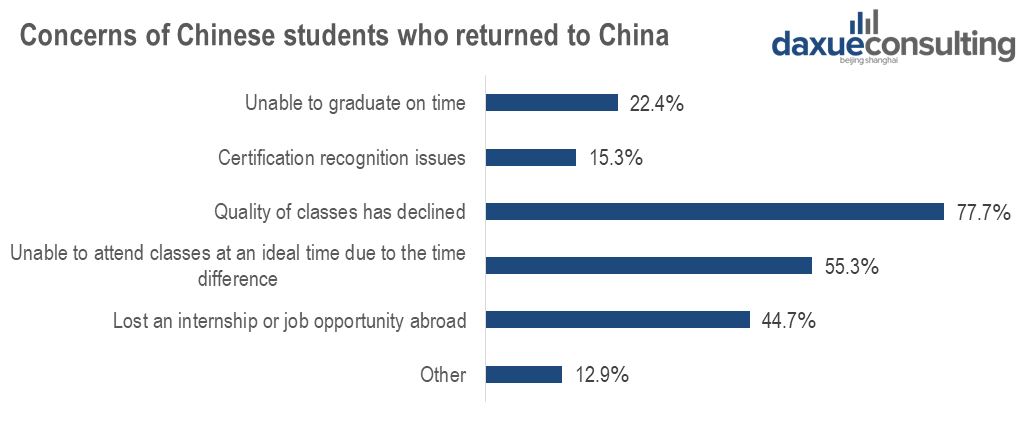
Data Source: Daxue consulting COVID-19 student impact survey: Worries of Chinese students who came back to China during COVID-19
Incoming Chinese students studying abroad were concerned about whether they can start their program on time
The Coronavirus outbreak also influences incoming Chinese students studying abroad. Firstly, applicants cannot take tests like TOEFL, IELTS, and GRE in China, resulting in their incapability in applying for programs. Thanks to many universities’ policies, many of them got these tests waived. What worries them now is whether they can get visas and start their programs on campus on time. Notably, Chinese students studying in the U.S. are concerned about whether they can have eligibility to look for internships there. Only after staying in the U.S. for at least nine months are they are eligible for curricular practical training, meaning they can have part time jobs and internships. The limitation may make international students lose opportunities if they are starting programs with online courses.
Regarding international students’ predicament, many schools issued policies to help. Many schools allow students to defer to have more time to apply for visas. For example, Case Western Reserve University offers two options for incoming students who are unable to arrive at school on time. One is that students can defer to Spring 2021. The other option is to take online courses that contain a 25% discount on tuition in Fall 2020. Then, students can attend classes on campus in Spring 2021.
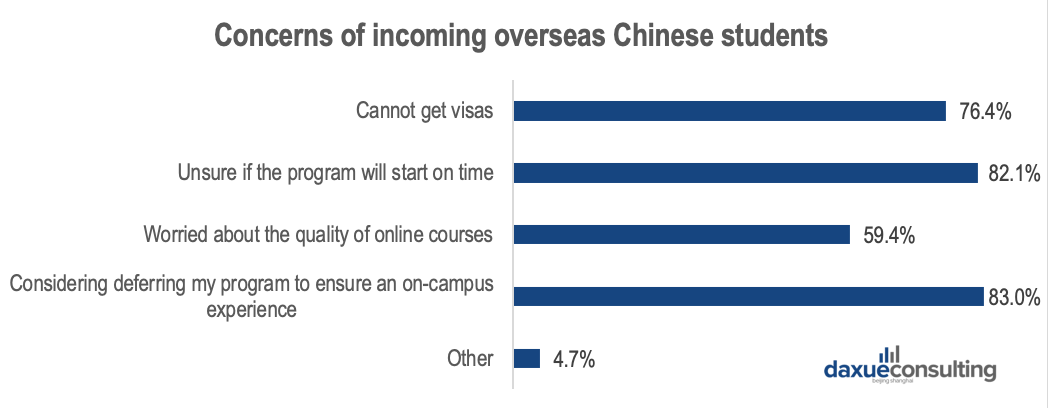
Data Source: Daxue consulting COVID-19 student impact survey: Worries of COVID-19 of incoming Chinese overseas students
Chinese students who plan to study abroad in the future also hesitated to apply
Plenty of Chinese students apply for overseas schools every year. However, this year, they meet many dilemmas. They are supposed to take their required tests now, but test centers cancelled tests. Some students planned to do summer research in overseas schools, but are currently unable to get visas and fly to those countries. Also, many Chinese students who got offers this year decide to defer their enrollment. They would like to attend schools next year. Providing that schools keep the class sizes to ensure program quality, the admission size next year may shrink. Of the students who were hoping to study abroad in the future, nearly half are receiving less support from family and peers in studying abroad, and nearly a quarter say they are now less interested in studying abroad.
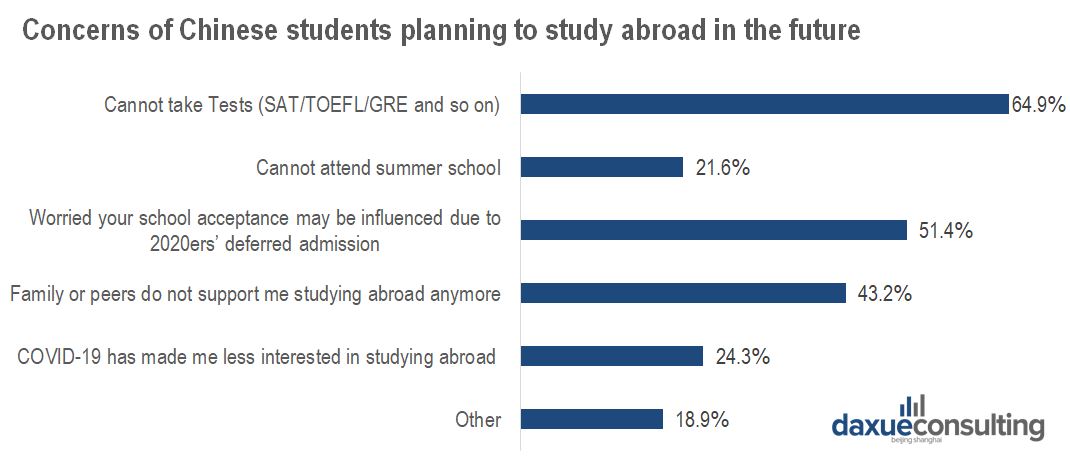
Data Source: Daxue consulting COVID-19 student impact survey: Worries of Chinese Students Who Plan to Study Abroad in the Future
Most students are still positive about their overseas plans
The sudden COVID-19 outbreak changed people’s lives, and many students are reconsidering their plans. However, life still goes on despite uncertainty. Though external factors like cancelled tests, grounded flights, and worried parents may seem discouraging in the short term, a majority of Chinese students maintain their plans to study abroad. Despite that COVID-19 impacted Chinese students abroad in many ways, the long term trend is that less Chinese stay abroad after graduation, this may contribute to that trend.
Listen to 100 China entrepreneur stories on China Paradigms, the China business podcast
Listen to China Paradigm on Apple Podcast






